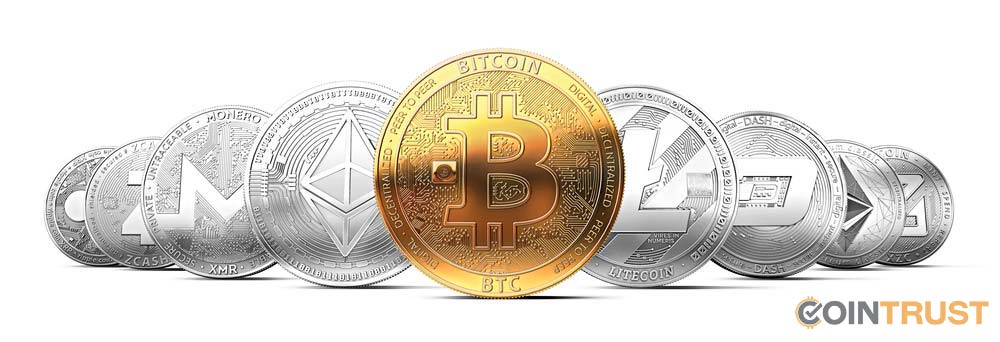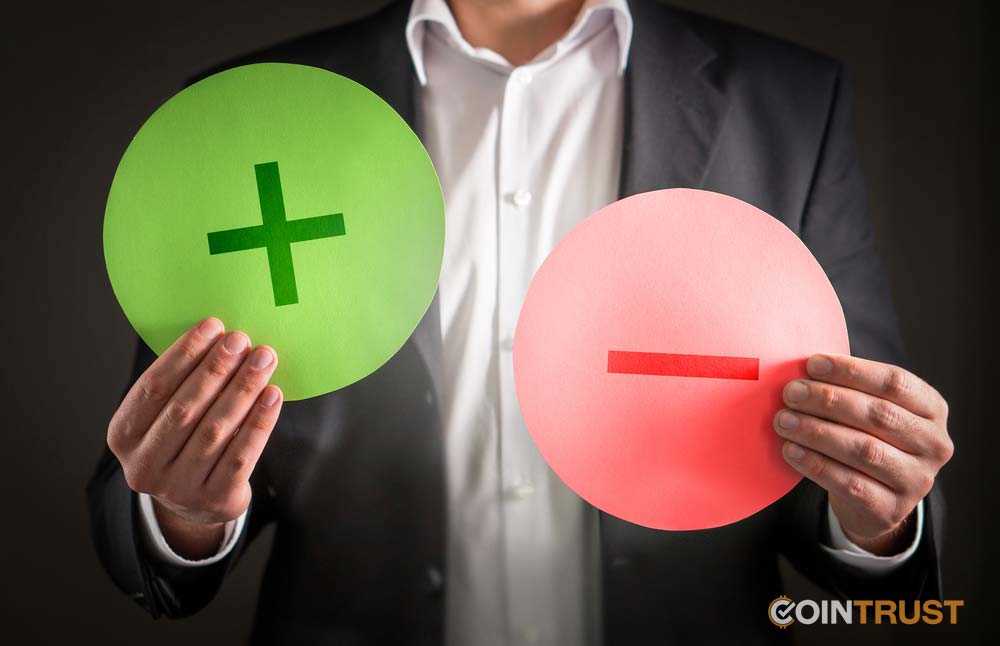 Cryptocurrency – Top 100 Crypto, Where to buy? + Everything you need to know.
Cryptocurrency – Top 100 Crypto, Where to buy? + Everything you need to know.
The technology underlying cryptocurrencies is hard to understand, even for tech savvy people. Still, cryptocurrencies generate a lot of excitement at present among developers, financial institutions, governments, investors, and the general public.
Cryptocurrencies are a global phenomenon. Almost everybody has heard about them although very few have actually understood them. Those who are aware of the cryptocurrency development wonder if these coins will replace real money in the future or vanish as suddenly as they appeared.
Meanwhile, almost every accounting firm, software firm, bank, and government has researched cryptocurrencies or launched their own blockchain projects or published papers about it. Needless to say, everybody is not a fan of cryptocurrencies and many feel that they are just a scam. But many who have grabbed the cryptocurrency opportunity have turned into millionaires overnight.
Bitcoin is widely considered to be the world’s first cryptocurrency. But Satoshi Nakamoto, its unknown inventor, never wanted to create a cryptocurrency. He only wanted to develop what he called a “peer-to-peer electronic cash system” that would be completely decentralized and prevent double spending. Cryptocurrencies are just a byproduct of this decentralized cash system. A cryptocurrency is just a limited entry in a database, which cannot be changed without satisfying certain conditions.
| Coins | Expert Score | Price | More Info |
|---|---|---|---|
|
5/5 Read Review
 |
106 user ratings |
$14,030.50 |
|
|
4.8/5 Read Review
 |
109 user ratings |
$875.48 |
|
|
4.5/5 Read Review
 |
106 user ratings |
$2,543.39 |
|
|
4.5/5 Read Review
 |
111 user ratings |
$1,211.26 |
|
|
4/5 Read Review
 |
109 user ratings |
$0.738021 |
|
|
4/5 Read Review
 |
115 user ratings |
$213.05 |
|
|
4/5 Read Review
 |
116 user ratings |
$1.0642 |
|
|
3.75/5 Read Review
 |
116 user ratings |
$2 |
|
|
3.5/5 Read Review
 |
113 user ratings |
$2.81 |
|
|
3.5/5 Read Review
 |
114 user ratings |
$0.321168 |
|
|
3/5 Read Review
 |
113 user ratings |
$0.238606 |
|
|
2.2/5 Read Review
 |
113 user ratings |
$0.1141 |
|
|
2/5 Read Review
 |
119 user ratings |
$14.62 |
|
|
2/5 Read Review
 |
121 user ratings |
$0.02 |
|
|
2/5 Read Review
 |
123 user ratings |
$347.95 |
How Cryptocurrencies Work
To understand how cryptocurrencies work, let us take the example of the Bitcoin platform, considering the fact that it is the first of its kind in the world.
 The Bitcoin platform is made up of a large network of peers. Each of them has a copy of all the transactions processed on the bitcoin network. Each transaction is signed by a private key held by the person who initiates that transaction. A copy of this transaction goes to every peer in the network. In other words, the entire network comes to know about this transaction, but it takes time for the transaction to get confirmed. Once a transaction is confirmed, it is irreversible. It becomes a part of the blockchain that can never be changed or removed. It is the job of a miner to confirm the transaction, and when every miner has done it, it becomes a part of the blockchain. The miner gets rewarded with coins for doing this work.
The Bitcoin platform is made up of a large network of peers. Each of them has a copy of all the transactions processed on the bitcoin network. Each transaction is signed by a private key held by the person who initiates that transaction. A copy of this transaction goes to every peer in the network. In other words, the entire network comes to know about this transaction, but it takes time for the transaction to get confirmed. Once a transaction is confirmed, it is irreversible. It becomes a part of the blockchain that can never be changed or removed. It is the job of a miner to confirm the transaction, and when every miner has done it, it becomes a part of the blockchain. The miner gets rewarded with coins for doing this work.
In order to qualify to become a miner, he/she should provide proof of work by solving a cryptography puzzle. Cryptocurrencies are called so because they are based on solving cryptography puzzles. Hence, it is math that secures the entire system, not people or trust. Most cryptocurrencies are based on Bitcoin’s blockchain technology although they try to overcome Bitcoin’s problems by introducing innovative features. No cryptocurrency, so far, has managed to achieve the stature of Bitcoin.
How to Mine Cryptocurrencies
 A cryptocurrency works through a network of peers, and each peer in the network has a copy of all the transactions processed on the network. Each transaction is signed by the private key of the person who initiated it. A copy of this transaction reaches every peer in the network instantly, but gets confirmed only after some time. This is because confirmation is of paramount importance. Transactions remain in a pending state and can even be forged if they remain unconfirmed. Once the transaction is confirmed, nobody can alter its details. As previously mentioned, nobody can reverse it because it becomes part of an unchangeable record of transactions called the blockchain. In other words, it becomes a block in the blockchain.
A cryptocurrency works through a network of peers, and each peer in the network has a copy of all the transactions processed on the network. Each transaction is signed by the private key of the person who initiated it. A copy of this transaction reaches every peer in the network instantly, but gets confirmed only after some time. This is because confirmation is of paramount importance. Transactions remain in a pending state and can even be forged if they remain unconfirmed. Once the transaction is confirmed, nobody can alter its details. As previously mentioned, nobody can reverse it because it becomes part of an unchangeable record of transactions called the blockchain. In other words, it becomes a block in the blockchain.
Only a miner is qualified to confirm a transaction. Miners receive transactions, declare them to be legitimate, and spread this information in the blockchain network. Once a miner confirms the transaction, all peers have to include it in their respective database. For doing this, miners are rewarded with coins.
What Miners Do
 Anybody can become a miner. Since nobody has any control over who can become a miner, cryptocurrencies require an inbuilt mechanism to prevent a miner or group of miners from taking advantage of the system. For example, someone can create a lot of peers and confirm transactions that are forged. This would be the end of the system, but this hardly happens.
Anybody can become a miner. Since nobody has any control over who can become a miner, cryptocurrencies require an inbuilt mechanism to prevent a miner or group of miners from taking advantage of the system. For example, someone can create a lot of peers and confirm transactions that are forged. This would be the end of the system, but this hardly happens.
Miners, therefore, have to follow a rule. They have to invest some work to qualify to become a miner. In other words, they have to solve a cryptographic problem and discover a hash that can connect the new block with the previous block. This system is called proof of work. In case of the Bitcoin Network, it is based on an algorithm called SHA 256 Hash. Once miners find this hash, they can successfully create a block and introduce it to the blockchain. The miner receives a few coins for doing this.
To put it simply, you can mine coins only if you solve cryptographic problems. Depending on the difficulty of this problem, you will have to invest in a powerful computer. For this reason, you cannot mine too many coins in a specific period of time. Nobody in the blockchain network can break these rules.
World’s Best Cryptocurrencies
Today we have more than 3600 cryptocurrencies just because somebody thought of creating a system in which money is unfettered by geographical constraints. However, all cryptocurrencies are not the same as they were all created with different intentions. Some of them were created just for a joke. Some of them are just Ponzi schemes cleverly disguised as cryptocurrencies. Some of them were created just because their founder found a way of making a quick buck at the expense of gullible investors. The fact that cryptocurrencies act like assets and are highly volatile has given rise to a number of scams in the industry.
But this doesn’t mean that you should avoid investing in cryptocurrencies. It simply means that you should do your homework well before investing your hard-earned money on a coin that may turn out to be worthless.
Here is a list of the world’s best cryptocurrencies:
Bitcoin: This is the world’s first cryptocurrency and essentially the best. So far, no coin has been able to achieve the success of Bitcoin, let alone surpass it. Bitcoin has the largest market cap of about $10 billion and was created in 2009 by an anonymous individual or organization called Satoshi Nakamoto.
Ethereum: Ethereum is a decentralized blockchain platform that executes P2P smart contracts. It was created in 2015 by Vitalik Buterin and has a $1.1 billion market cap. The cryptocurrency associated with Ethereum is Ether. Later, Ethereum split into Ethereum Classic (ETC) and Ethereum (ETH).
Litecoin: Launched in Oct 2011 by Charles Lee, a former employee of Google, Litecoin attempts to be a substitute for Bitcoin. It bears a striking similarity to Bitcoin and has a market cap of around $180 million.
Monero: Monero is famous for its ring signature technology, which it uses to provide better privacy to its users. This private, secure, and untraceable cryptocurrency comes with a market cap of $138 million. Mostly, people who wish to remain anonymous online use Monero.
Ripple: Ripple is not just a cryptocurrency, but also a currency exchange, remittance network, and real-time gross settlement system. The system was launched in 2012 and has a market cap of around $243 million. A few financial institutions and banks have integrated the Ripple system to cut costs.
Dogecoin: Although created for a joke, Dogecoin has a number of faithful followers. Launched by Billy Markus, a computer programmer, in Dec 2013, it is now used to reward forum users and donate at fund raisers.
IOTA: IOTA has captured attention because it is a cryptocurrency that does not use any blockchain to do away with transaction fees and to reduce computational requirements. The heart and soul of IOTA is Tangle, its sophisticated ledger technology.
Stellar: It bears a striking similarity to Ripple and wants to win over the hearts of financial institutions and banks. As such, it is one of the toughest competitors of Ripple.
Lisk: Lisk wants to be the first modular blockchain in the world. In this system, each distributed app is not only a token, but also a blockchain. Its features include decentralized storage on standalone blockchains, anonymous transactions, and social blogging.
Uses of Cryptocurrencies
The blockchain technology that powers cryptocurrencies is awesome, but you may still wonder about the uses of this technology.
 Here are some great ways in which you can actually use your coins:
Here are some great ways in which you can actually use your coins:
#1: Donate to a worthy cause.
If you donate in fiat currencies, half of your money may be filtered out before it actually reaches the beneficiaries. If you donate your bitcoins and altcoins to worthy causes, you can rest assured that the entire amount reaches your beneficiary.
#2: Use bitcoins to pay your travel expenses.
Cheap Air (www.cheapair.com) announced in 2013 that they will be first travel agency online to accept payments in bitcoins. You can purchase hotel rooms, book flight tickets, or rent cars at Cheap Air.
#3: Pay for your education in bitcoins.
The world’s first accredited university to accept fees from its students in bitcoins through BitPay is the Cyprus based University of Nicosia. This university also offers a masters course in digital currency.
#4: Donate at a crowd funding event.
You can help someone become successful by donating at their crowd funding event. Several companies have built crowd funding platforms using the Bitcoin network. Some of the most successful crowdfunding events were based around an altcoin called Dogecoin.
#5: Send your coins to friends or relatives.
This is the most common way to use bitcoins and altcoins–send it to friends and relatives so that they can enjoy their benefits.
#6: Use your coins to manage your wealth.
You can use the services of firms like SwissBorg to build a portfolio of crypto assets. This company is giving investors a great opportunity to manage their assets without any restrictions or boundaries.
#7: Eliminate fraud related to elections.
The possibility of using cryptocurrencies to eliminate cheating related to elections is now being considered. For example, a nonprofit organization called Democracy Earth is now in the process of building an app that will combine blockchain technology with voting. According its co-founder Santiago Siri, cryptocurrency will make it impossible for any kind of fraud or cheating related to money.
Features of Cryptocurrencies
All cryptocurrencies are based on blockchain technology and share common feature. However, users must understand that whenever a new cryptocurrency appears in the industry, it makes an attempt to overcome the technical issues faced by its predecessors:
Here is a list of the common features of cryptocurrencies:
#1: Transactions made in cryptocurrencies are irreversible.
Once your transaction has been confirmed, you or anybody else cannot reverse it. The money that you sent remains sent. If you had sent that money to a scammer by mistake, you cannot retrieve it.
#2: Cryptocurrency transactions are anonymous.
If you are a cryptocurrency user, nobody can make out your true identity. You will receive your coins on an address that looks like a chain of several characters. Nobody can use that address to find out who you are.
#3: You can send money quickly to anybody in the world.
Your transactions are processed instantly and you will receive confirmation in a few minutes. Since these transactions are processed through a network of computers scattered all over the world, they are least bothered about physical location. You can send your coins to your next door neighbor or a relative residing halfway across the globe. It makes no difference to the transaction speed.
#4: Cryptocurrencies are safe and secure.
Your coins are securely locked in a cryptography system that requires a public key and a private key. You can send coins only if you have the private key. Nobody can break this secure system.
#5: You don’t need anybody’s permission to use cryptocurrencies.
You don’t have to obtain the permission of any government, bank, organization, institution, or individual to use cryptocurrencies. This is because most cryptocurrencies are open-source software that can be downloaded free of charge at any time. Once you install the software on your device, you can use it to send and receive coins.
#6: There can never be an unlimited supply of coins.
The number of cryptocurrencies is limited. In case of Bitcoin, the software is built in such a way that the supply of bitcoins will diminish somewhere around 2140. Since a schedule is embedded in a cryptocurrency code, limiting the supply of coins, it is possible to predict the exact number of coins that can be mined within a given time.
#7: Cryptocurrency is not representative of debt.
Your coins are just as good as gold. Cryptocurrencies are not like fiat currency, which represents debts as it is an IOU system.
Pros and Cons of Investing in Cryptocurrencies
Investing in cryptocurrencies has both advantages and disadvantages. Let us first examine the pros. Popular cyptocurrencies such as litecoins, bitcoins, and ether have displayed rapid growth. People have now gained trust in Bitcoin and feel that it is here to stay. The value of Bitcoin doesn’t look like it will fall anytime soon. Experts say that each bitcoin token will become worth $25,000 in the near future.
 Cryptocurrencies are volatile and nobody can predict their value in the future, but investors are optimistic and many of them have been rich by trading in bitcoins and popular altcoins. In fact, the biggest advantage of cryptocurrencies is their volatility. As a shrewd trader, you can always buy when the price is low and sell when the price is high. If you make wise trading decisions, you can always make a lot of money even with the worst coins.
Cryptocurrencies are volatile and nobody can predict their value in the future, but investors are optimistic and many of them have been rich by trading in bitcoins and popular altcoins. In fact, the biggest advantage of cryptocurrencies is their volatility. As a shrewd trader, you can always buy when the price is low and sell when the price is high. If you make wise trading decisions, you can always make a lot of money even with the worst coins.
As for the cons, there are as many cons as there are pros. In the first place, you never know when a cryptocurrency might vanish from the scene or be replaced by a better coin. One doesn’t even know if Bitcoin will stay around or be replaced by a better technology. Second, digital currencies are unregulated. Third, there are too many scam coins around that only aim at separating investors from their money. Finally, cryptocurrency investment is fraught with risks and you simply cannot afford to invest your life savings in coins.
Conclusion
The technology that powers cryptocurrencies is definitely revolutionary, something that just cannot be ignored. They have attracted attention because they are not under the control of any government, political party, bank, or financial institution. They are real money that not only maintains its value, but also increases it as time passes—just as gold does. In addition, they preserve your privacy and allow you to remain anonymous.
Although created as payment systems, cryptocurrencies have attracted the attention of speculators and investors. As a result, we have plenty of exchanges such as Poloniex, Coinbase, Okcoin, and others that enable trading in a wide range of cryptocurrencies. The coins, however, are extremely volatile—their value keeps fluctuating day by day. If you want to invest in them, use only money that you can afford to lose.






